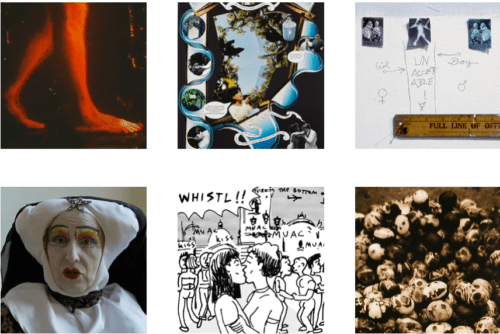“Don’t Worry, Just Pretend”: On Being a Marmoulak
Marmoulak, or the lizard, serves a couple of symbolic purposes in the film, referencing the lizard’s ability to climb walls and its facility for metamorphosis and camouflage (see Image 1 below). This is not to suggest that the film director or scriptwriter of Marmoulak—or any of the other Iranian films that use passing as a significant component of the narrative—definitely thought about the concept of passing theoretically. In her discussion of teletechnology as both an environment and a set of objects other than human agency, Patricia Clough questions the normative idealization of thought as rational and the “non coincidence of the subject with consciousness” by mapping the unconscious thought of teletechnology. 1 Her critique opens up space for the conceptualization of the thought outside subjectivity by giving it its own movement, intensities, and effects.

The film starts with the sound of a siren and policemen commanding Reza to stop climbing a wall. The scene visually displays a number of important issues. First is the interpellation of the subject/Reza by the shouting of the policemen as he is stopped from climbing a wall. As a subject, Reza is predisposed to identify the call of the policeman. Second is the significance of the wall as indicative of spatial divisions that are regulated, controlled, and policed by the disciplinary and security apparatuses of the modern state that distinguish between the legal versus the illegal, the normal versus the abnormal, and the law abiding versus the criminal subjects. Third is the portrayal of Reza, or the performative subject, perceived by the others as well as social institutions. 2
The film continues with a scene where a pigeon is trapped in a prison’s security wires becoming the subject of the prisoners’ concern. Everyone, from the guards to the prisoners, is looking for a way to save the pigeon when Reza reveals that he could climb the wall and rescue it. The prison administrator arrives at this moment and promises Reza a week of relief from prison work if he climbs the wall. To the cheers and applause of the prisoners and the guards, Reza skillfully climbs the wall and exposes his ability to escape the prison. He also gets a chance to glance at life beyond the prison walls. However, instead of relieving Reza from prison work, the administrator puts Reza in solitary confinement and enhances the security of the prison walls to prevent Reza from escaping. Reza then becomes the object of prison administrative surveillance and looses any possibility of escape. However, in the very brief moment while he is saving the pigeon, the temporary division between the surveyor (the prison guards) and the surveyed (the prisoners) is collapsed, threatening the order of the prison while providing Reza an opportunity to view street life beyond the prison’s wall. This is a crucial moment in which the film screens the limits of visibility and the potentiality of being a marmoulak. When Reza returns to his prison cell, we hear the voice of another prisoner singing a famous popular song by the beloved Iranian pop singer, Marzieh, making allusions to crying as both a display of sadness as well as a mirror reflecting the shadow of the lover.
“My teardrops fell, my eyes became seas
In my teardrops your shadow appeared”
In this emotionally charged moment where the subject fails to hide her/his grief, the shadow of the lover appears in the tears leaving no space for inhibition. Desperate to escape from the prison, and singled out by the prison administrator who uses every opportunity to humiliate and punish Reza, he is injured and taken to the hospital. Overcrowding in the prisoner section sends him to the regular ward, where he ends up sharing a room with a clergyman. In one of his conversations with the Akhund, who happens to be called Reza and who shows a great deal of kindness and compassion towards Marmoulak, the clergyman talks to him about each individual’s path to God (an idea influenced by Sufi teachings of Islam) and provides space for the discourse of religion to include the outlaw and the criminal. In a conversation with the clergyman, Reza claims that his destiny is eternally doomed, thus showing his skepticism of religion and the idea of heaven and earth. The clergyman responds by saying that “there are as many ways to reach God as there are people.” This statement saves Reza and is repeated throughout the film wherever religion converges with discourses of normativity and respectability.
While Reza assumes that this statement is part of Islamic religious teachings, the clergyman expands on it by reading a passage from Le Petit Prince by Antoine de Saint-Exupéry, arguing that indeed the idea goes beyond religious teachings. Linking the secular and the religious, the clergyman recites a passage that describes a conversation between a fox and a prince, where the fox defines taming or domestication as making someone love you. Again, the film alludes to the compliance of religion and secularism with a society that integrates its citizen-subjects by regulating them through either compliance or confinement. The machinery of the modern state produces docile bodies through disciplining and self-disciplining practices of domestication/education or punishment and incarceration. While the film exposes the failure of modern disciplinary practices and calls for affective attachment through the desire for love, life and hopefulness, it nevertheless conveys a concept of religion as a mechanism of control that includes the voluntary submission of its subjects.
This sequence also activates the Sufi teachings of Islam, especially Rumi’s well-known poem on the conversation between “Moses and the Shepherd.” Moses hears a shepherd talking to God in his own language, telling him that he wants to comb his hair, fix his shoes, wash his clothes, and pick the lice out of his hair. Moses gets angry and blames him for using blasphemous language to talk to the creator of the world. The shepherd tears off his clothes and cries out about how sad, sorry and repentant he is. A sudden revelation comes to Moses and reminds him that his mission is to unite, not separate God from his creatures. Moses is told that God has given each being a unique way of seeing and knowing, and what may be wrong in one person’s views may be right for another. Repeating the passage “there are as many ways to reach God as there are people” throughout the film effectively counters the state-based disciplinary notion of religion and its complicity with the modern disciplinary practices of mental institutions and the prison-industrial complex, as advocated by the prison administrator. The film ends with the voice of Reza Marmoulak claiming a relationship with God as direct and unmediated, reminding the audience of the teachings of Sufism:
God is the heaviest dude in gentleness.
The heaviest dude in kindness
The heaviest dude in friendship
The heaviest dude in forgiveness.
This statement also emphasizes the hybridity of Islamic discourse and its modernity and mélange with the discourses of the disciplinary state. In this context secular and religious discourses converge and bring together the voice of the prison administrator with the European work of literature, the Hollywood film industry and the teaching of the Islamic religion to sustain a modern disciplinary society. 3 For Reza the clergyman, a modern/modernized religious apparatus cannot be a domesticating machine if it does not become inclusive of all the desiring subjects.
- Clough, 2000, 2-5.[↑]
- I refer to interpellation to talk about the hailing of the subject and its subjugation to the rule of the Islamic state (In its Althusserian terms). I also refer to Butler’s definition of gender performance as an act that is done partially without the subject’s knowledge but always done with or for another. In other words, the subject does not preexist the act (Butler, 1999, 2004).[↑]
- This is indeed the postmodern where modern has detached itself from modernization as stated by Negri(2011, 5). Here the anterior time of religion in what Elizabeth Freeman (2005, 57) calls the chronopolitics of modernization and development converges with the secular time of the nation-state putting both notions of secular and religious into crisis.[↑]



